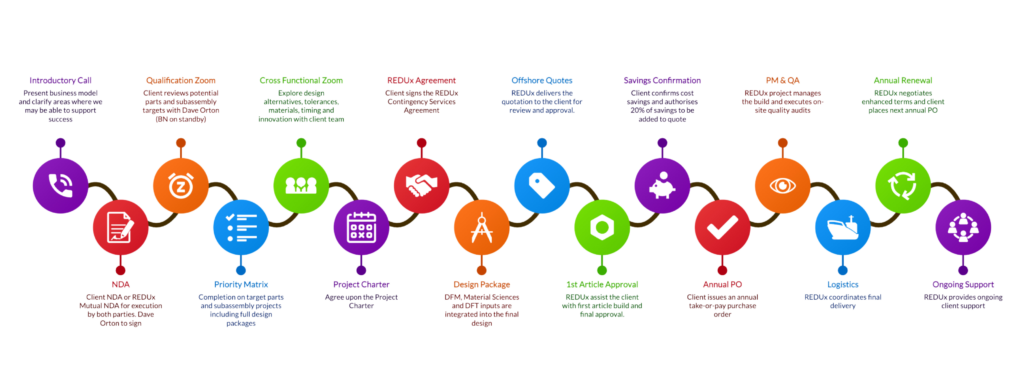DFM + MANAGED OFFSHORING x (CONTINGENCY) = ZERO RISK SAVINGS
Engagement: We start with an introductory call to understand your needs and identify areas where REDUx can enhance your success. Following a mutual NDA, we provide our Priority Matrix for you to detail target parts and subassemblies. This information allows us to pinpoint high-viability projects.
Verification & Innovation: We review your submissions, offering rough estimates of potential savings and recommending strong candidate projects. Our team provides Design for Manufacturability (DFM), material science, and shipping optimization (DFL) inputs to maximize your savings beyond simple offshoring. Together, we finalize the design package and proceed with vendor quotations.
- Verification & Innovation: We review your submissions, offering rough estimates of potential savings and recommending strong candidate projects. Our team provides
- Design for Manufacturability (DFM),
- material science
- and
- shipping optimization (DFL)
- inputs to maximize your savings beyond simple offshoring. Together, we finalize the design package and proceed with vendor quotations.
Validation: REDUx assists with vendor qualification, including visits and audits, and supports you through the first article build and final approval, ensuring quality and compliance.
Value-Added Partnership: Your finance team confirms pre-project costs and validates the savings. We then add 20% of the savings to the new part cost, which is paid directly to REDUx by the manufacturer. You issue a 12-month purchase order to the selected manufacturer, and we establish and monitor Key Performance Indicators (KPIs) to ensure ongoing success.

Why Choose REDUxCOST?
No Upfront Costs
We operate on a contingency basis, earning only from the savings you realize.
Expert Team
Our professionals bring over 80 years of combined experience in supply chain optimization, including Registered Professional Engineers and Six Sigma ASQ-Certified Supplier Development Engineers.
Global Network
Benefit from our pre-qualified manufacturing partners in Vietnam, China, India, Eastern Europe, and Mexico, all meeting rigorous certifications across various industries.

